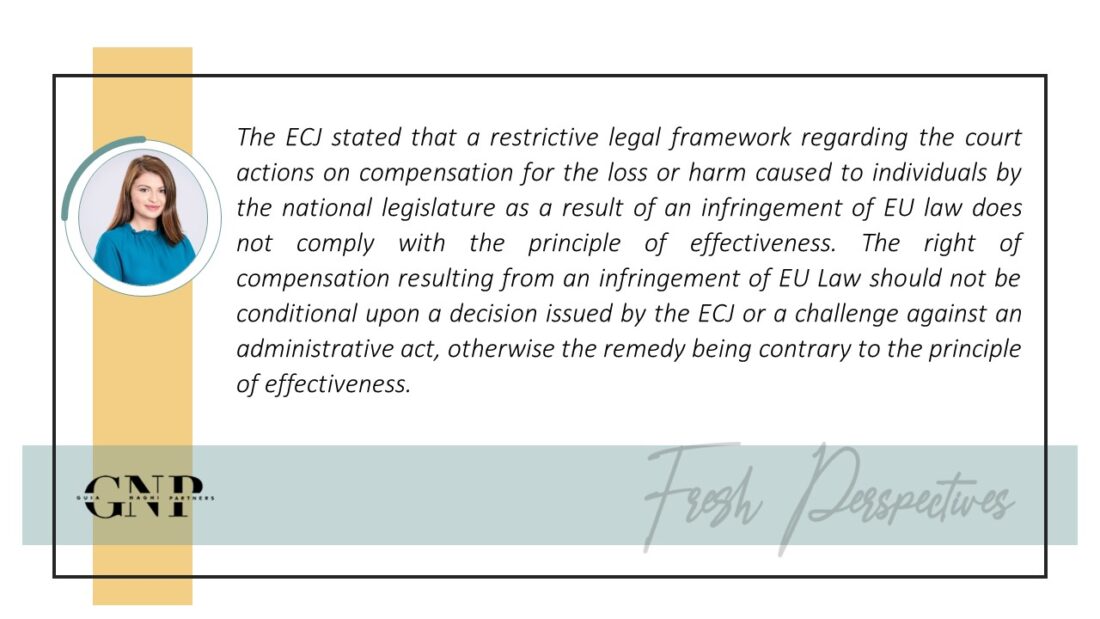Violeta Geru – ECJ finds a breach of the principle of effectiveness. The compensation for the loss or harm caused to individuals by the national legislature as a result of an infringement of EU law.
The European Union Court of Justice (Grand Chamber – „ECJ”) analysed an action (case C-278/20) brought by the European Commission for failure of the Kingdom of Spain to fulfil obligations under Article 258 TFEU. On 28 June 2022, the ECJ held that the Kingdom of Spain has failed to fulfil its obligations under the principle of effectiveness. Thus, if the right of compensation for the loss or harm caused to individuals by the Spanish legislature as a result of an infringement of EU law is subjected to restrictive conditions, the principle of effectiveness is breached.
Spain declared that the disputed legal provisions regulate a specific remedy, complementary to other remedies aimed at recovering the damage incurred following the acts issued by the public authorities. The Court held that the assessment of compliance with the principle of effectiveness does not require an analysis of all the legal remedies available in a Member State.
The Court also noted that the possibility to request damages is available only in relation to loss or harm caused by public authorities, and there is nothing to indicate that it would enable an individual to be compensated for loss or harm caused by an act or a failure to act on the part of the legislature that contravenes EU law.
The condition related to the existence of a decision of the Court declaring that the statutory provision applied is incompatible with EU law
The Court reiterated the already settled case law on the infringement of the principle of effectiveness of the law if the right to compensation of loss or harm caused to an individual for failure of the Member State to comply with the EU Law is conditional upon a prior finding by the Court of an infringement of EU law attributable to that Member State. Therefore, compensation for the loss or harm caused by a breach of EU law attributable to a Member State cannot be conditional on the requirement that the existence of such a breach must be clear from a preliminary ruling delivered by the Court.
The condition related to the existence of a national court decision dismissing an action against the administrative act that caused the harm
A second requirement regulated by the Spanish law refers to the condition that the harmed individual has obtained, before any court, a final decision dismissing an action brought against the administrative act which caused the loss or harm. Given the abovementioned prerequisite for a damage claim against the state, the Court held that the Spanish Law makes it impossible to obtain compensation in those situations where the loss or harm results from an act or omission on the part of the legislature contrary to EU law, without there being an administrative act which the individual may challenge.
The Court also states that it cannot be accepted that the individual harmed in such a situation would be required, by active conduct, to bring about the issuance of an administrative act which could subsequently be challenged, since such an act could not, in any event, be regarded as having caused the alleged loss or harm. Therefore, in the absence of any exception for cases where the loss or harm stems from an act or omission on the part of the legislature, contrary to EU law, without there being an administrative act open to challenge, the Spanish Law is contrary to the principle of effectiveness.
In view of the specific obligations of national legislatures concerning the transposition of EU law into domestic law, it is not in fact unusual for their activity to be the immediate cause of loss or harm sustained by individuals.
The legal provisions regarding the time limit for bringing an action for compensation
Pursuant to the Spanish Law, an individual must bring the action within a limitation period of one year from the publication in the Official Journal of the decision of the Court declaring that the statutory provision applied is incompatible with EU law. Secondly, the national legal provisions state the condition that compensation may be awarded only in respect of loss or harm which occurred within five years preceding the date of that publication, unless otherwise provided for in that decision.
First, the Court noted that the limitation period of one year since the publication of the ECJ decision does not cover the cases in which such a decision does not exist. Second, the existence of such a decision, according to the actual wording of the Spanish Law, constitutes a condition which necessarily must be satisfied even before such an action can be brought.
The Court held that it may be excessively difficult, or even impossible, to anticipate what kind of infringement of EU law will ultimately be recognised by the ECJ. Moreover, imposing an individual to have had already pleaded the infringement of EU law even at a stage prior to the action being brought against the administrative act giving rise to the loss or harm amounts to an excessive procedural complication, contrary to the principle of effectiveness.
Conclusions
The ECJ ruling is relevant in the context of the Romanian legal framework regulating the liability of the state and/or public authorities for the loss or harm caused to individuals from two perspectives.
First, it limits the procedural autonomy of the Member State in aspects related to the recovery of damage suffered following a breach of the EU Law and applies extensively the principle of effectiveness. An assessment of the Romanian legal framework regarding the compensation for the loss or harm caused to individuals by the national legislature as a result of an infringement of EU law in the light to the ECJ ruling might reveal a potential breach of the principle of effectiveness.
Second, the principle of effectiveness as applied in the ECJ ruling is also relevant in the context of the current practice of the Romanian courts when it comes to the time limits for bringing an action against the state and/or public authorities. Therefore, when the courts analyse the start of the statute of limitation term of one year, as provided in the Administrative Litigation Act, should also consider the ECJ ruling and the principle of effectiveness of the law.





No Comments